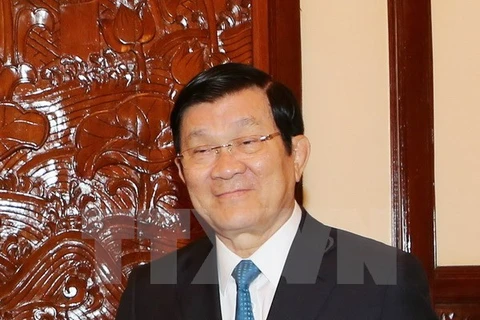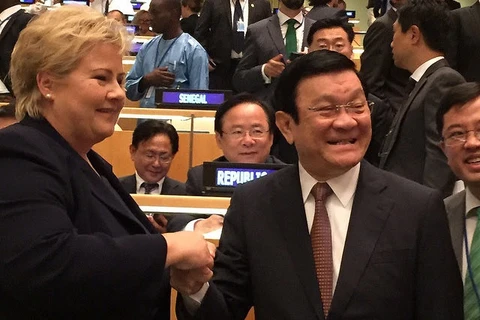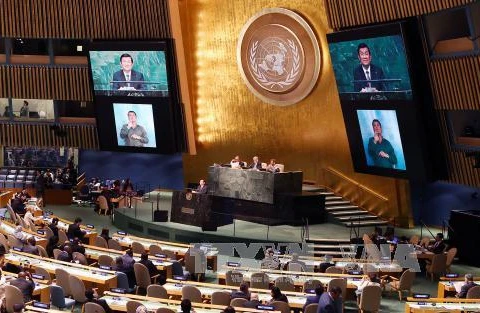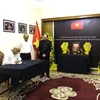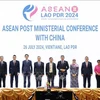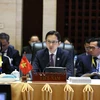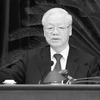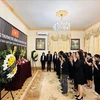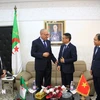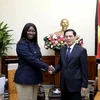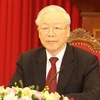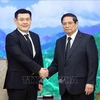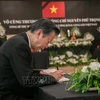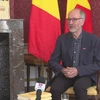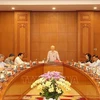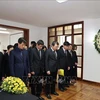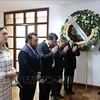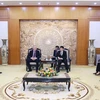Vietnam has made great strides in the development of her rural areas thanks to a national programme to promote new rural development, President Truong Tan Sang has told a special high-level event on a new rural development paradigm and the inclusive and sustainable new community model at the United Nation Headquarters in New York, the US.
Following is the full text of the President’s address at the event, which was held by the UNDP, OECD, and the Republic of Korea as part of the United Nations Summit to Adopt the Post-2015 Development Agenda.
“Excellency Secretary General,
Excellency President Park Geun-Hye,
Ladies and Gentlemen,
It gives me great pleasure to attend this special event on A New Rural Development Paradigm and the Inclusive and Sustainable Community inspired by Saemaul Undong and co-organised by the Republic of Korea, UNDP and OECD. I believe that our event today provides a substantial forum for us to share experiences in realising policies and models on rural development in our countries.
Excellency Secretary General,
The Agenda 2030 on Sustainable Development puts forward a new strategic vision, which reflects our aspiration of a world without poverty. However, in many developing countries, three-fourths of the poor people are living in rural areas and making their living from agriculture. Rich and poor gap between rural and urban areas is widening.
Therefore, Vietnam and many other countries have strongly supported the mainstreaming of agricultural and rural development in the Agenda 2030, particularly the sustainable development goal 2.A: “Increase investment in rural infrastructure, agricultural research and extension services, technology development and plant and livestock gene banks in order to enhance agricultural productive capacity in developing countries”, with a view to promoting sustainable agriculture, narrowing the rich-poor gap between rural and urban areas, thus contributing to the overall progress of the society.
Rural development is an important cause and at the same time a major challenge to almost all developing countries since their resources and budget are tight. As a result, developing countries should work out an appropriate development strategy which best suits their conditions. Each country has their own experiences in agricultural and rural development.
The successes of Saemaul Undong Movement, deeply rooted in simple but very efficient ideas have turned the poor and backward rural areas in the ROK into those of prosperity and modernity. The key element making the movement a great success is to bring into full use the role of the people. All criteria to select projects derive from the interests of the people. This is an invaluable lesson that Vietnam and other developing countries could learn. The idea behind the movement coincides with the consistent policy of Vietnam placing the people at the heart of all development strategies. Therefore, we have learned from the movement during our efforts to build new rural areas, and attained positive outcomes.
Excellency Secretary General,
As an agricultural country with 70 percent of our population living in the rural area, rural development and sustainable rural community have an important role to play in the overall development of our country. Since 2010, Vietnam has implemented the National Program on New Rural Development with 19 criteria to promote rural development, improve living standards and increase income of the farmers. Great strides have been made in development of Vietnam’s rural area. 700,000 km of rural roads have been renovated and newly built; over 20,000 classrooms and thousands of cultural houses, clinics, clean-water supply stations, irrigation systems have been built in rural area. More than 19,000 production models applying advanced technologies have been implemented. The coordination between businesses and scientists has borne fruits. As a result, rural areas in Vietnam have changed significantly, especially in terms of infrastructure and income. I would like to share some of our experiences on new rural development as follows:
First, the comprehensive, inclusive and long term socio-economic development in rural area requires strong political commitment and engagement of the entire political system and the active participation of the whole society. We need to raise the awareness of the community and give priorities to the recruitment and training of key officials at all levels. The village and commune officials should be provided with basic knowledge on new rural development so that they can move forward the process with minimum resources.
Second, no one understands the rural area better than those living there. Therefore, rural development should be mastered by the people. The Government must give them autonomy. Based on their actual demands, the people will decide on what to do first and how they will do it. The Government should then allocate resources to these primary demands.
Third, sustainable rural development requires large-scaled investment. Financial assistance from the Government is necessary but not enough. We need to socialise and diversify resources and make the use of resources transparent following the motto “known by the people, done by the people, discussed by the people, inspected by the people and benefited by the people”. Therefore, the Government should put forward policies that encourage and facilitate the engagement of businesses and political – social organisations in the process of rural building. It is also equally important to bring into full play the internal resources of the rural community. Resources mobilised from the community can come in different forms, such as labour and financial contributions to public projects, improving housing conditions and using credits for business production.
Excellency Secretary General,
It is not easy to identify an effective method and model for rural development. The New Rural Program in Vietnam is a result of our continuous study of the lessons from other countries and our own past successes and failures. We are willing to share our experiences so that we can achieve sustainable development and successfully implement the 2030 Development Agenda while ensuring that “no one is left behind” in that process.
Thank you.”

